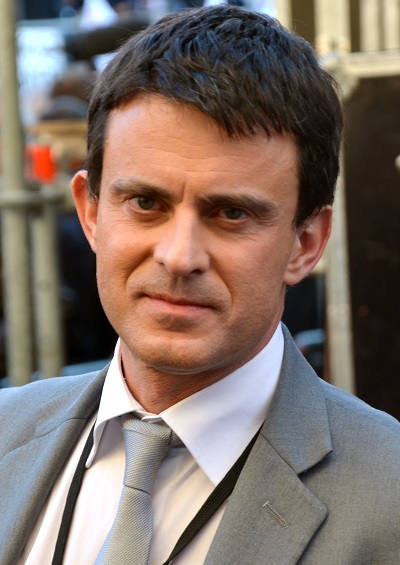Manuel Valls: The Man to Remake France
France’s new prime minister could herald significant changes in Europe’s economic landscape.
April 1, 2014

France’s embattled Socialist president, François Hollande, has crossed the Rubicon and named Manuel Valls to head his government as the country’s new prime minister.
Valls is a pro-market right-leaning Atlanticist who makes no secret of his admiration for Britain’s former leader Tony Blair.
France’s new prime minister believes the market, not the state, should shape economic growth, creating jobs and prosperity. His nomination could do more than just bring a tilt away from overdone Green politics in France.
If France under Valls tilts away from the statist camp, which the French have traditionally led, he would achieve much more than fulfill the classic French tradition of having France being a co-equal again with Germany in the modern concert of Europe.
Such a goal is a recipe for gaining status diplomatically, but not for generating growth. That can only be achieved if Valls’ path for France leads to a true rebalancing of economic forces inside Europe to strengthen proponents of market-based thinking all over.
This applies all the more so, as in Italy – the other main laggard on Europe’s necessary road to economic reforms – is now led by Matteo Renzi. He is making a similarly determined push, as Valls now seems to be preparing in France.
France’s and Italy’s Schroeder Moment
Getting that job done in either country isn’t hard to do in terms of substance (it’s well known what needs to happen). The real challenge obviously concerns the politics of the situation.
One can only hope that the situation is like that in Germany in the mid-1990s – that, in order to bring about the reforms that are necessary, major West European countries must have government that is considered left-of-center. That may well be the only way to make these reforms palatable to the constituencies that have long been opposed.
Even much more so than Germany under Gerhard Schroeder, France needs massive reforms. And it needs, Thatcher style, a revolutionary assault on vested trade union interests and old state-centered thinking.
It helps to be ambitious
Valls does not lack ambition, nor does he lack the will and energy. But it remains questionable whether he commands sufficient support in the French parliament and in the Socialist party.
However, many entrenched left-wingers in France will not want him to do well. In that case, President Hollande’s fate is sealed. He will lose the next French presidential elections in 2017.
The former interior minister’s nomination came after the humiliation of the ruling Socialists in Sunday’s mid-term municipal elections. The Socialists lost control of 115 cities and towns, although their candidates won as mayors of Paris and Lyon – as well as in the symbolic European capital Strasbourg.
Valls, the man
I have known Valls since he entered the international political scene as the spokesman and key advisor of Lionel Jospin. A French Socialist, he became prime minister in 1997, one month after Tony Blair became Britain’s prime minister.
Valls admires Blair not because of his ill-fated support for the Iraq war, but in full view of his four years as one of Jospin’s closest aides up to 2001.
After the French Socialists were swept from power in 2002, Valls spent a decade asking the core question that few on the left in France have wanted to pose, let alone answer: How does modern social democracy function in an era of globe-spanning individualization? In such a world, do the classic 20th century ideas and organization of the left have any role any longer?
The title of his 2008 book, “Time to Bury the Old Socialism and and Finally Become the Left,” expressed commitment to market-oriented thinking. It was seriously at odds with traditional French Socialist statism.
He is even a man of Angela Merkel’s ilk. She has gone on record repeatedly saying that, if there is no economic growth, then there is nothing governments can do to redistribute – and to make their societies fairer.
Not 100% French
Like Nicolas Sarkozy, Hollande’s predecessor, Valls is not 100% French. That helps the new prime minister to see France through untainted eyes.
Valls was born in Barcelona in 1962 and became a French citizen aged 20. He speaks Catalan, Spanish and Italian. He joins the new Socialist Mayor of Paris, Anne Hildago, who was born in Cadiz, as two of the most powerful politicians in France with personal backgrounds on the other side of the Pyrenees.
Valls is a tough politician with plentiful experience of political machinery gleaned from 35 years of Socialist party infighting. In many ways, he is the antithesis of Hollande. He also makes no pretense to be a grand intellectual.
One question Valls kept asking whenever he and I met in Paris or elsewhere was: “How did Blair keep winning elections?” He saw quickly that the French Socialist government after 1997 was going nowhere in comparison to the élan and innovation of the pre-Iraq war Blair administration.
The French Socialists have never won two consecutive parliamentary majorities. Former President François Mitterrand’s two-term 14 years as president disguised the reality that – in 1986, 1991 and 1995 – voters ejected Socialist ministers in parliamentary elections.
Valls saw the same fate befall the 1997-2002 Jospin government. By comparison, Blair seemed a miracle worker. He won three elections in a row.
Valls is the antithesis of the traditional French left. A strong Atlanticist and supporter of Israel, he has taken part in Bilderberg Group conferences which are a chinwag meeting of pro-American, economically liberal politicians. Often depicted in sinister conspiratorial terms, Bilderberg outings are quite dull. That Valls chose to accept an invitation speaks volumes.
Takeaways
France’s new prime minister, Manuel Valls, is a pro-market right-leaning Atlanticist.
France’s new prime minister believes in the market, not the state, as the key economic force.
If France tilts away from the statist camp, that could lead to a true rebalancing of economic forces inside Europe.
Read previous

Don’t Count the Democrats Out Just Yet
April 1, 2014
